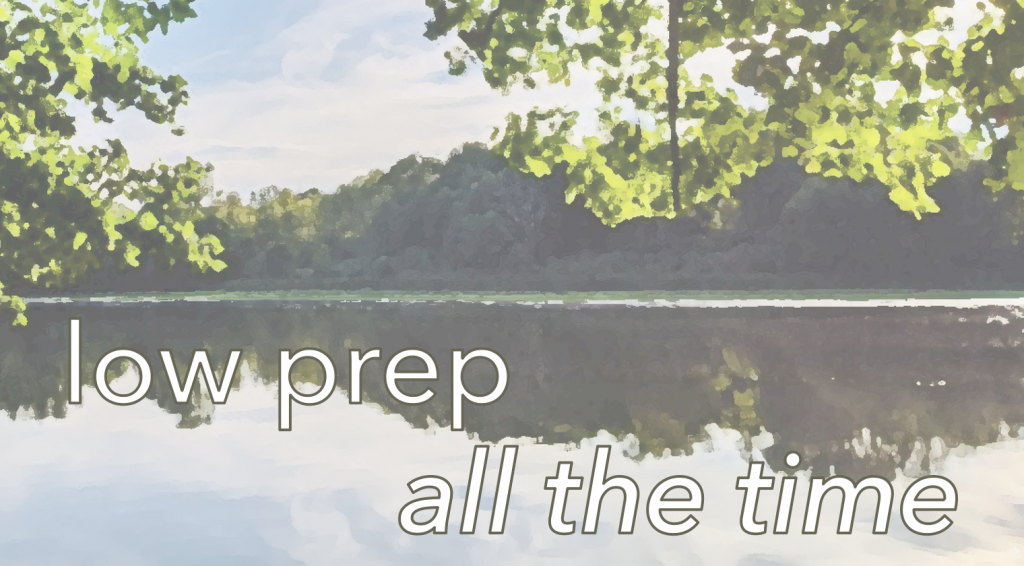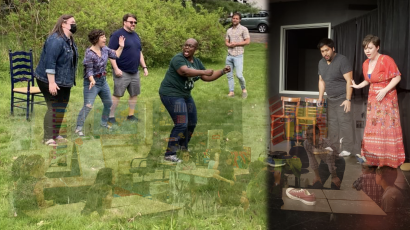You Don’t Outgrow Support

By Justin Slocum Bailey | 5 min read
I was recently allowed—or forced—to face some insights into the beautiful, terrifying, earthy humanness that means we need both our own vigilance and each other.
Content Warning: brief reference to suicidal ideation
Consider these images—stills from a video I made recently for TeachHuman Low-Prep Strategy #24, The Walk:

A viewer of these pictures, or of the video from which they are drawn, sees an intrigued, amused, focused, alive JSB.
Let me tell you what was happening just half an hour earlier.
Learning at 75 Miles per Hour
Not 30 minutes before I hit Record, I was driving home on the freeway, fighting both ongoing torment and a fresh defeat. I had an intense urge that I know too well, though I had not felt it for a long time: to yank the wheel hard to the right at high speed.
Fortunately, I had just enough sense to call Ashley (of Improv for Educators) and burst out that I needed her to talk to me and keep me talking. She…
- reminded me of the worth-it-ness of seeing what tomorrow would bring,
- talked me through concrete things I wanted or felt I still needed to do,
- took some of those very things off my plate, and
- helped me start thinking in terms of small steps, one of which was to make the Low-Prep Strategy of the Week video from which the images above are drawn.
I almost needed to pull over anyway because I was crying too hard to see. I was spared from this by nothing other than a traffic jam caused by three trucks that had in fact driven off the road and capsized—presumably not on purpose.
I wiped my tears, rounded the scene, got quickly to my exit and my apartment, splashed some water on my face, and went back out to film a video that a lot of people might see without being any the wiser about what preceded it.
Why am I sharing this? Because the story contains reminders I know I need, and statistics say some of you need, too:
1. You don’t outgrow the need for support and disciplines.

I have been dealing with self-harm and all that surrounds it since I was seven years old. I have done lasting damage to myself (you can glimpse some on my neck in the pictures) and multiple times stood on the precipice of a step that, had I taken it, I could not have walked back. I have learned techniques to counter these things; I have sometimes gone years at a time without injuring myself; I have in some ways mastered the requisite self-discipline. But I’m not immune to anything. And, as hard as it is to admit for this avoidant-dismissive guy, I need other people in order to survive. So do you. Reach out and rely on other people, even if you don’t think you’re close enough to them. People want to be there for you.
2. Remind yourself, or tell someone to remind you, of things you need to hear or of skills you know but can’t summon.
Part of me knows that things don’t tend to stay at maximum horribleness forever. But I needed another voice to tell me.
I know all about breaking overwhelming things down into smaller things. But yesterday I couldn’t access that skill alone.
I’ve got life-saving mantras for days. But on that road I couldn’t think of one.
All I knew was that I needed to call someone and say, “Tell me it’s not worth driving off the road.”

3. Slap some water on your face.
Force your body to feel a sudden change. It can shock your system into positive action, or at least into not acting destructively.
4. Get outside.
We all know this one, right? Just do it. Before you do something dumb, before you let yourself collapse, just stick your head out the door. Then have the rest of you join it.
5. Do something.
Something other than sit and think. I made a video, but you don’t have to produce anything, let alone put pressure on yourself to create something for other people. Just do something.

2 Hours Earlier
There’s more to the story, though. I want to share something that happened about two hours before the events described above, on the very same grass you see pictured.
I was taking my own advice by getting outside and moving my body. But as I ran across the grass in that park, at one point I suddenly collapsed facedown on the ground.
I was not too physically exhausted, and I hadn’t been running hard enough to collapse. (I’ve done that before and know what it feels like.)
No, I was simply crying too hard to stand.
Instead of making myself get up quickly, I spent some time completely prone, some on my knees, and some more in child’s pose. And, with my face pressed against the ground, I remembered an exercise that another friend had taken me through on the phone just the night before, an exercise of identifying specific items one can see, hear, touch, smell, or taste in a moment of stress.
So I inhaled the short grass deeply through my nose. I clutched it in my fingers and felt the dirt imprinting my knees. And I stayed like that for a little while.
Did it “work”? Well, when I eventually pressed myself up on my hands and knees, I threw up, and it wasn’t from exercise, food, or physical illness. It was still emotional. But I did feel better, and I got home safely. I wonder, even, if not for those breaths of grass, would I have had the sliver of awareness and discipline to call Ashley from the car later?
There’s no way to know, but I’m taking no chances, and I recommend you don’t, either.
Just smell something.
Recovery or ‘health’ may require more, but survival in that moment might just require smelling the grass, or a tin of coffee, or the air, or your own armpit.
And let this serve as yet another reminder of the value of something I historically am disinclined to do, but have been doing more and more:
Reach out.
My experience has confirmed again and again: You are not alone, and people are eager to remind you of that.
For much more guidance on teaching and being well, join TeachHuman’s flagship training program Teach Like a Human, which features hundreds of practical techniques and challenging ideas to help you thrive in and out of the classroom—all while applying the principles to train your students and improve the systems in which you work.
If you are a language teacher interested in engaging students while doing less work yourself, check out the Low-Prep Strategies of the Week mentioned in this post!

Related Blog Posts
By Ashley Davis | 6 min read I walk into a classroom full of fifth-graders whose eyes are already either rolling or sizing me up. It is my first class …
By Justin Slocum Bailey | 2 min read Teaching and preparing to teach can be a ton of work. My guess is, you want to do less work. Even …
By Justin Slocum Bailey | 2 min read The mantra Humans First helps me remember two crucial concepts. The first is that nothing is more important than human beings. The …



